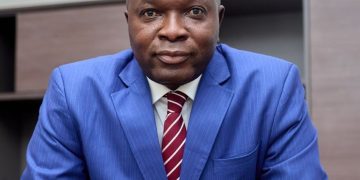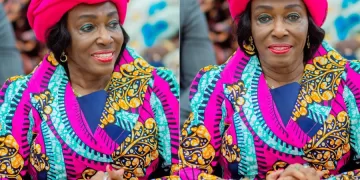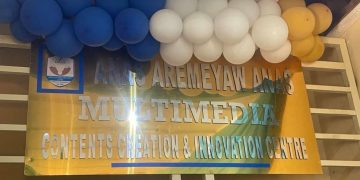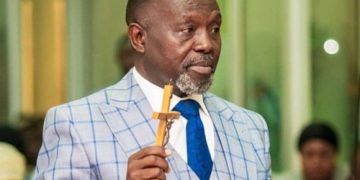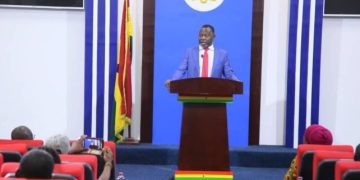The Minister Designate for Information, Fatimatu Abubakar has said that President Nana Addo Dankwa Addo will give an account of what he has done with the mandate of the people in the State of the Nation Address (SONA) which he will deliver today Tuesday February 27.
He says the president is expected to talk about security issues and also economic recovery programmes.
Speaking in an exclusive interview with TV3’s Beatrice Adu, on Monday February 26, she said “He will give an account of what he has done with the mandate in terms of security, in terms of the economic recovery program that we are on and what the country has done since 2022 is to set us back on the path of stability and recovery, this is what the president of the republic will love to throw a lot of light on.
Article 67 of the 1992 Constitution requires the President to brief Parliament on the State of the Nation.
It says, “The President shall, at the beginning of each session of Parliament and before a dissolution of Parliament, deliver to Parliament a message on the state of the nation.”
On Tuesday February 27, 2024, President Akufo-Addo will honour this responsibility. The time is 10:00am and the venue is the chamber of Parliament within the State House.
As has become the norm, the President will recount the achievements of his administration and roll out his vision for the coming year.
3news.com will present a comprehensive coverage of the event.
The SONA is expected to be attended by Ministers of State, former presidents, members of the Diplomatic Corp, chiefs and queens.
In the 2023 SONA, President Akufo-Addo touched on various sectors of the economy. Here are excerpts from the 2023 address:
Expenditure on COVID -19
Mr Speaker, it was Government that asked for the COVID funds to be audited, and I can assure this House that nothing dishonourable was done with the COVID funds. The responses from the Ministers for Health and Finance, on January 23 and 25, 2023, respectively, have sufficiently laid to rest the queries from the Auditor-General’s report, and I believe any objective scrutiny of these statements from the Health and Finance Ministries would justify this conclusion.
Public Debt
Beyond the use of COVID funds, there are legitimate questions being asked about how the country’s debt situation got where it is. Mr Speaker, let me state emphatically that we have not been reckless in borrowing and in spending. It is worth noting that the debts we are servicing were not only contracted during the period of this administration.
Support for MSMEs
We provided five hundred and eighteen million cedis (GH¢518 million) of grants and loans to micro, small and medium-scale enterprises (MSMEs) through the NBSSI, now the Ghana Enterprise Agency, in which three hundred and two thousand, five hundred and fifteen (302,515) enterprises benefitted, of which sixty percent (60%) were women-owned. These were MSMEs that were in distress as a result of the pandemic. For some traders, the receipt of one thousand cedis (GH¢1,000) made the difference between the ruin of the household and survival.
Supply of free water during Covid-19 pandemic
All households enjoyed free water supply and huge discounts on electricity bills, because access to water was a necessity to ensure people adhered to hygiene practices, and access to electricity was important as everybody was encouraged to stay at home. It also provided an economic cushion to protect lives and livelihoods at a time of difficulty. Today, the government support for utility bills is being projected by some as a waste or to use that word, so beloved of some commentators, profligate.
Infrastructure development
Yes, I have been in a hurry to get things done, and this includes massive developments in agriculture, education, health, irrigation, roads, rails, ports, airports, sea defence, digitisation, social protection programmes, industrialisation and tourism. We can be justifiably proud of the many things we have managed to do in the past six (6) years. As I go around the country, I hear the pleas for roads, schools, hospitals, and, as the rainy season comes, I wish, as every other Ghanaian does, that we would have built more drains than we have. And I wish we had the resources to do more.
Road construction
Mr Speaker, I would like to state categorically that this Government has built more roads than any government in the history of the 4th Republic, and Mr. Speaker, the details of all these roads are attached in the annex to this Message. I have done so because, last year, when I made a similar pronouncement, I was met with howls and gasps of incredulity from the Minority benches, and so I thought it appropriate, this time, to present it as an annex to the Statement, which will be part of Hansard.
Gold for Oil Policy
In addition to our engagement with the Fund, we are also seeking and implementing some original and innovative ideas to try to solve our problems. For example, the Gold Purchase Programme by the Bank of Ghana and the Gold for Oil Policy are creative uses of our resources, which are already bearing fruit. These policies are aimed at achieving two results that are critical to the health of our economy. Firstly, they will help us preserve foreign exchange, especially the US dollar, and secondly, they will enable us to stabilise the price of oil products such as petrol and diesel on the domestic market. We have already seen some success on both fronts with the price of US dollars and petroleum products falling since we announced the policy and began to implement it.
National Security
I do worry about the extraordinary expenditure on security at our borders, but we do not have a choice but to spend resources to keep our borders safe. We dare not compromise on the safety and security of our nation, and my first responsibility as your Commander-In-Chief is to keep all of us safe. The foundation for all development is the safety and security of our nation and its people.
The reality of the state of affairs in our neighbourhood demands that the government goes to great lengths to ensure the security, safety and stability of our nation. The threats of terrorism and violent extremism surrounding us require that we pay maximum attention to protecting our borders, and working in collaboration with our neighbours to keep our country and the Region safe. This is the prime motive for the Accra Initiative, which is already yielding results.
Mr. Speaker, I am able to cite here some of the equipment we have provided the military to help them protect us all. Allow me to list a few. The Army has received 104 armoured personnel carriers; seventy (70) utility troop carrying vehicles; twenty (20) armoured vehicles; 85 assorted Toyota vehicles; 50 Ankai buses; 40 Jeep J8 vehicles; some Explosive Ordnance Disposal (EOD) equipment; large quantities of communication/surveillance equipment; varying quantities of weapons and four un-maned aerial vehicle systems; and the Ghana Navy has taken delivery of four offshore security vessels and four Zodiac boats.
We have also continued the process of upgrading the housing needs of the security services. The Barracks Regeneration Project Phases I and II, the Military Housing Project Phases I and II and the Ghana Military Academy Infrastructure project are expected to be completed and handed over by the end of May this year.
Mr Speaker, we continue to pay attention to the Police Service. We can now see more of the police on our streets in the urban areas. Ever so gradually, driving on our roads is becoming more orderly. I note that even motorbike riders now stop at traffic lights. Things are improving. Five hundred and four (504) housing units, comprising 72; one bedroom and 432 self-contained units have been completed for the Police Service. Recently, I delivered 100 pickups, 600 motorbikes and six armoured personnel carriers to the Police Service to boost operational capacity. For the first time in our nation’s history, the Police Service has dedicated helicopters to help with their operations.


